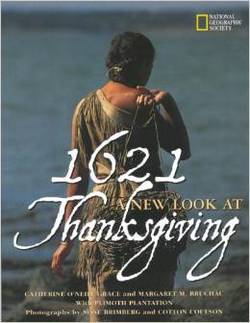
The Wamanoag Indians were not alarmed by the arrival of Puritans on their shores in 1620, but they allegedly did not rush to greet them either. According to native tradition, Squanto, a Wamanoag who spoke English, showed the colonists how to plant corn, to fish, and to survive on the land, but the two peoples were not best of friends. The Indian account of the first Thanksgiving is as follows. Alarmed to hear gunfire from the Puritan settlement, 90 armed Wamanoag warriors proceeded to the settlement to find that the Puritan men were shooting fowl for a feast. The Puritans invited the warriors to dine with them, but there wasn't enough food to feed 90 warriors, so the Indians went into the woods and returned with enough venison and fowl for all. A feast of Puritans and 90 native warriors does not sound like our traditional concept of the first Thanksgiving dinner.
In fact, the Puritans and the Wamanoag did not always get along well, and recently the Wamanoag people decided to make their complaints public. On each Thanksgiving Day since 1970, Womanoag Native Americans have staged an event at Plymouth, Massachusetts that they call The Day of National Mourning. When Wamutta James, a Womanoag Native American, was asked by the Commonwealth of Massachusetts to make a speech to commemorate the 350th anniversary of the Puritan landing at Plymouth, he accepted the invitation. However, after the organizers of the event heard that James was going to say words like: "We, the Wampanoag, welcomed you, the white man, with open arms, little knowing that that was the beginning of the end," they rescinded their invitation for him to speak. The National Day of Mourning has become a day for the native people to dance, sing, and feast, feeding up to 500 people who come from near and far to participate in the celebration. They still criticize the injustice of the colonists and honor the deaths of their ancestors caused by actions taken by the colonists, but they also want to shine light on the problems of many Native Americans who are living below the poverty level and discuss other issues of interest to them. Books like 1621 A NEW LOOK AT THANKSGIVING have become popular as various groups of citizens lobby to put the books in public schools and stress the negative aspects of American history that have often been overlooked. One can only hope that a balance can be achieved. Whatever the truth may be about the Thanksgiving holiday, the spirit of the holiday is the important thing to emphasize, not whether the Puritans and the Indians loved one another. When asked what the Wamanoags think about Thanksgiving, Gladys Widdiss, a tribal elder, said, "Everyday (is) a day of thanksgiving to the Wampanoag....There (is) always something to be thankful for."
In fact, the Puritans and the Wamanoag did not always get along well, and recently the Wamanoag people decided to make their complaints public. On each Thanksgiving Day since 1970, Womanoag Native Americans have staged an event at Plymouth, Massachusetts that they call The Day of National Mourning. When Wamutta James, a Womanoag Native American, was asked by the Commonwealth of Massachusetts to make a speech to commemorate the 350th anniversary of the Puritan landing at Plymouth, he accepted the invitation. However, after the organizers of the event heard that James was going to say words like: "We, the Wampanoag, welcomed you, the white man, with open arms, little knowing that that was the beginning of the end," they rescinded their invitation for him to speak. The National Day of Mourning has become a day for the native people to dance, sing, and feast, feeding up to 500 people who come from near and far to participate in the celebration. They still criticize the injustice of the colonists and honor the deaths of their ancestors caused by actions taken by the colonists, but they also want to shine light on the problems of many Native Americans who are living below the poverty level and discuss other issues of interest to them. Books like 1621 A NEW LOOK AT THANKSGIVING have become popular as various groups of citizens lobby to put the books in public schools and stress the negative aspects of American history that have often been overlooked. One can only hope that a balance can be achieved. Whatever the truth may be about the Thanksgiving holiday, the spirit of the holiday is the important thing to emphasize, not whether the Puritans and the Indians loved one another. When asked what the Wamanoags think about Thanksgiving, Gladys Widdiss, a tribal elder, said, "Everyday (is) a day of thanksgiving to the Wampanoag....There (is) always something to be thankful for."
 RSS Feed
RSS Feed